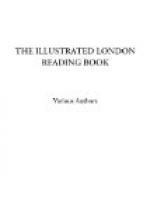And ever, when the moon was
low,
And the shrill
winds were up and away
In the white curtain, to and
fro
She saw the gusty
shadow sway.
But when the moon was very
low,
And wild winds
bound within their cell,
The shadow of
the poplar fell
Upon her bed, across her brow.
She only said,
“The night is dreary—
He
cometh not,” she said;
She said, “I
am aweary, weary,
I
would that I were dead!”
All day, within the dreary
house,
The doors upon
their hinges creak’d;
The blue-fly sang i’
the pane; the mouse
Behind the mould’ring
wainscot shriek’d,
Or from the crevice peer’d
about.
Old faces glimmer’d
through the doors;
Old footsteps
trod the upper floors;
Old voices called her from
without:
She only said,
“My life is dreary—
He
cometh not,” she said;
She said, “I
am aweary, weary,
I
would that I were dead!”
The sparrow’s chirrup
on the roof,
The slow clock
ticking, and the sound
Which to the wooing wind aloof
The poplar made,
did all confound
Her sense; but most she loathed
the hour
When the thick-moated
sunbeam lay
Athwart the chambers,
and the day
Was sloping towards his western
bower.
Then said she,
“I am very dreary—
He
will not come,” she said;
She wept, “I
am aweary, weary,
I
would that I were dead!”
TENNYSON.
* * * * *
RISE OF POETRY AMONG THE ROMANS.
The Romans, in the infancy of their state, were entirely rude and unpolished. They came from shepherds; they were increased from the refuse of the nations around them; and their manners agreed with their original. As they lived wholly on tilling their ground at home, or on plunder from their neighbours, war was their business, and agriculture the chief art they followed. Long after this, when they had spread their conquests over a great part of Italy, and began to make a considerable figure in the world—even their great men retained a roughness, which they raised into a virtue, by calling it Roman spirit; and which might often much better have been called Roman barbarity. It seems to me, that there was more of austerity than justice, and more of insolence than courage, in some of their most celebrated actions. However that be, this is certain, that they were at first a nation of soldiers and husbandmen: roughness was long an applauded character among them; and a sort of rusticity reigned, even in their senate-house.
[Illustration: ANCIENT ROMAN CENTURION.]
In a nation originally of such a temper as this, taken up almost always in extending their territories, very often in settling the balance of power among themselves, and not unfrequently in both these at the same time, it was long before the politer arts made any appearance; and very long before they took root or flourished to any degree. Poetry was the first that did so; but such a poetry as one might expect among a warlike, busied, unpolished people.




